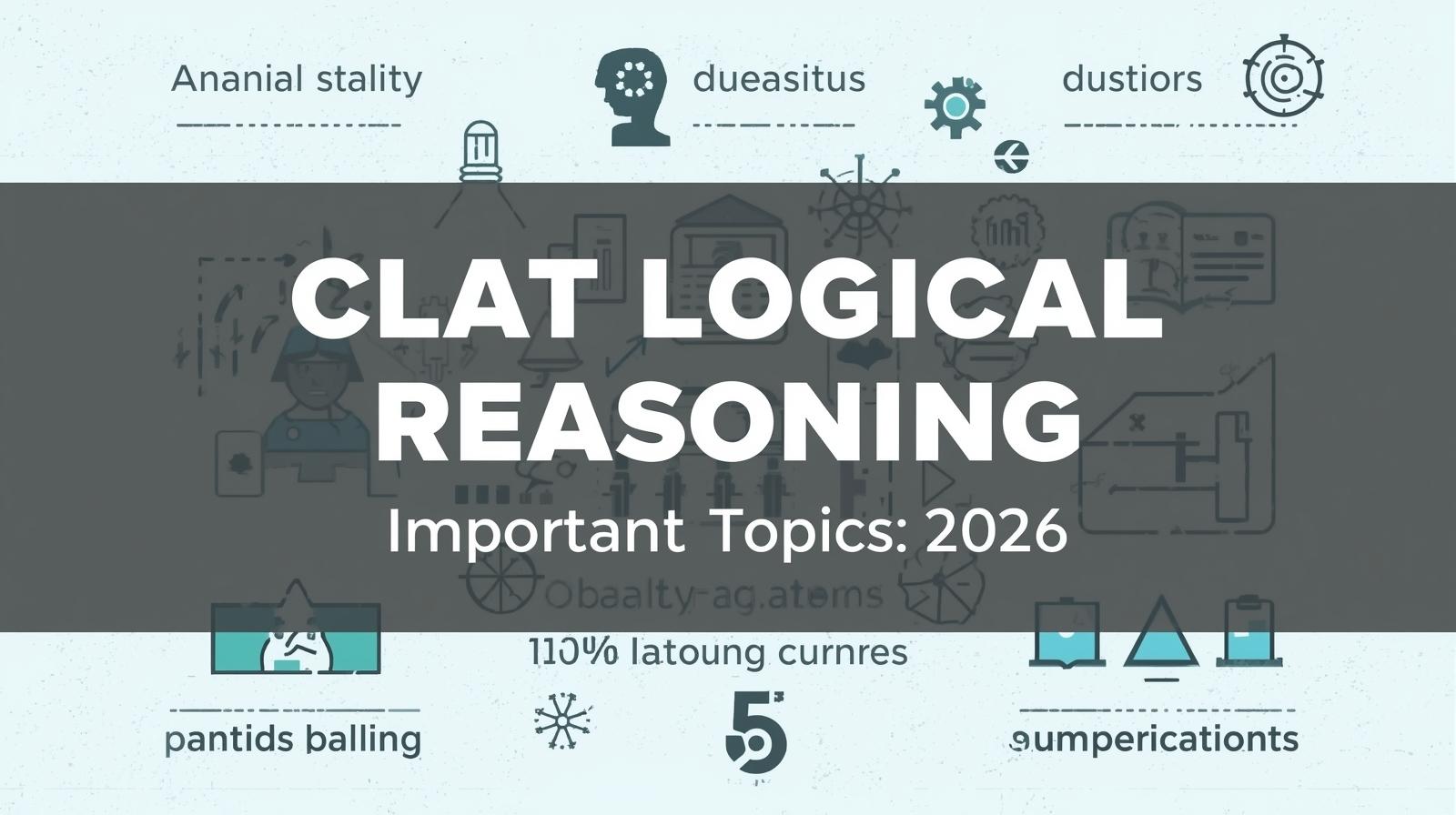CLAT Logical Reasoning Important Topics 2026: Your Ultimate Guide
Understanding the CLAT Logical Reasoning Section
The Logical Reasoning section of the Common Law Admission Test (CLAT) is a critical component of the examination. It accounts for about 20% of the paper. This section typically contains around 22 to 26 questions. The format has evolved significantly in recent years. The test now focuses exclusively on critical reasoning skills. You will be presented with short passages of approximately 300 words. These passages are followed by one or more multiple-choice questions. The passages are often excerpts from newspaper editorials, opinion pieces, or other argumentative texts. The section is designed to evaluate your ability to analyze, evaluate, and complete arguments. It is not a test of traditional logic puzzles or syllogisms. Instead, it measures your critical thinking and analytical aptitude.
Core Skills Evaluated in Logical Reasoning
To excel in this section, you must first understand the fundamental skills that are being tested. The questions are designed to assess a specific set of analytical abilities. Focusing your preparation on these core skills is the key to success.
Identifying Arguments, Premises, and Conclusions
This is the most foundational skill in critical reasoning. Every passage you encounter will contain an argument. An argument is composed of a main conclusion and one or more premises that support it. The conclusion is the author's main point or claim. The premises are the pieces of evidence or reasons the author provides to justify that conclusion. Your first task is always to deconstruct the passage. You must accurately identify these core components. Mastering this skill is essential. It forms the basis for answering almost every type of question in this section.
Drawing Inferences and Conclusions
An inference is a piece of information that must be true if the statements in the passage are true. It is a logical deduction that follows directly from the evidence provided. The ability to draw a valid inference is a key skill. You must be able to distinguish a logical inference from a mere possibility or a probable guess. The question will often ask what can be inferred or what the passage implies. This tests your ability to understand the logical consequences of the information presented in the text.
Recognizing Assumptions
An assumption is an unstated premise of an argument. It is a piece of information that the author takes for granted. The author believes it to be true but does not state it explicitly. An assumption acts as a necessary link between the premises and the conclusion. Without this unstated belief, the argument would fall apart. Questions about assumptions are very common in the CLAT. This skill tests your ability to identify the hidden foundations of an author's reasoning.
Strengthening and Weakening Arguments
This skill tests your ability to evaluate the strength of an argument. A question may ask you to identify a new piece of information that would either strengthen or weaken the author's conclusion. To strengthen an argument, you need to find a new fact that provides additional support for the conclusion. To weaken an argument, you must find a new fact that undermines the conclusion or attacks the link between the premises and the conclusion. This requires a deep understanding of the argument's structure.
A Breakdown of Important Topics and Question Types
Your preparation will be more effective if you are familiar with the specific types of questions asked in this section. Here is a breakdown of the most important question formats.
Identifying the Main Point or Conclusion
These questions directly test your ability to understand the author's central claim. They are a fundamental test of your reading comprehension and ability to identify an argument's structure. An example of such a question is, "Which of the following most accurately summarizes the author's main conclusion?"
Inference-Based Questions
These questions require you to make a logical deduction based on the information provided. The correct answer must be true according to the passage. These questions often use keywords like 'infer', 'imply', or 'suggests'. A typical question might be, "If the statements in the passage are true, which of the following must also be true?"
Assumption-Based Questions
This is a very frequent question type. It asks you to identify the unstated premise that the author's argument relies on. An example of this question format is, "The author's argument is based on which of the following assumptions?"
Strengthening the Argument
For these questions, you need to find a new piece of information that, if true, would make the author's conclusion more likely. The question might be phrased as, "Which of the following, if true, would lend the most support to the author's argument?"
Weakening the Argument
These questions are the opposite of strengthening questions. You must find a new fact that, if true, would make the author's conclusion less likely. A common phrasing is, "Which of the following, if true, would most seriously challenge the author's conclusion?"
Effective Preparation Strategy for Logical Reasoning
A structured preparation plan is essential for mastering this section. Follow these steps to build your logical reasoning skills effectively.
Start with the Fundamentals of Critical Reasoning
Before you start practicing, take some time to understand the theory. Make sure you have clear definitions for key terms. These include argument, premise, conclusion, assumption, and inference. A strong conceptual foundation will make it much easier to tackle complex questions. You can find many online resources or introductory books on critical reasoning.
Practice Deconstructing Arguments
Make it a daily habit to read the editorial page of a good national newspaper. As you read an article, try to apply your critical reasoning skills. Identify the author's main conclusion. Find the evidence or premises they use to support it. Think about any unstated assumptions the author might be making. This regular practice will train your mind to think analytically. It is one of the most effective ways to prepare for this section.
Solve a Variety of Question Types
Once you are comfortable with the basics, start solving practice questions. Do not focus on just one type of question. Make sure you practice exercises on assumptions, inferences, strengthening, and weakening arguments. This will ensure that you have a well-rounded preparation. It will also help you identify which question types are your strengths and which ones require more work.
Use Mock Tests and Previous Papers
The best way to gauge your preparation is by solving mock tests and previous years' papers. This will familiarize you with the actual exam environment. It will also help you build your speed and accuracy under time pressure. After every mock test, dedicate significant time to analyzing your performance. Go through every mistake you made. Understand why your chosen option was incorrect and why the correct option was right. This process of analysis is crucial for improvement.

 Info@Knowledgenation.co.in
Info@Knowledgenation.co.in











Leave a Comment